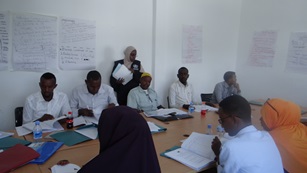 Mogadishu, Somalia, 30 November 2017 – The World Health Organization (WHO) in cooperation with the Somali Federal Ministry of Health concluded in Mogadishu today a 5-day national cascade training course on the management of severe acute malnutrition with medical complications.
Mogadishu, Somalia, 30 November 2017 – The World Health Organization (WHO) in cooperation with the Somali Federal Ministry of Health concluded in Mogadishu today a 5-day national cascade training course on the management of severe acute malnutrition with medical complications.
24 health workers from 12 nutritional stabilization centres in Somalia participated in the training course, which aimed at improving the quality of services in nutrition stabilization centres and reducing the mortality rate resulting from the mismanagement of cases of severe acute malnutrition.
The training course included information on procedures such as the preparation of therapeutic milk (F75 and F100) using locally available ingredients in case of stock-outs of F75 and F100. Participants were also trained on the management of cholera in severely malnourished children in accordance with WHO guidelines and technical recommendations.
“More than 1.4 million children in Somalia are still under the threat of acute malnutrition,” said Dr Ghulam Popal, WHO Representative to Somalia. “WHO will continue supporting the Federal Ministry of Health with the trainings and technical advice required to build the national health capacities and enable them manage the various malnutrition cases with medical complications,” he added.
The trend of acute malnutrition from 2014 to 2017 reflects a clear deterioration in the nutrition status of the population. The current drought crisis has increased the global acute malnutrition percentage from 12% in 2014 to 17.4% in 2017. As of October this year, a total of 388 000 cases of children suffering from acute malnutrition have been reported, while 87 000 have been diagnosed with severe acute malnutrition. According to the nutrition cluster, these figures are likely to increase more than threefold in 2018.
Since September 2017, WHO has conducted 2 training of trainers courses and 2 cascade training courses on the management of acute malnutrition with medical complications for a total of 75 participants from different parts of Somalia. The training courses were part of a programme designed by WHO, in coordination with local health authorities and the nutrition cluster, to respond to the drought crisis and build the capacity of the Ministry of Health nutrition teams to expand the training programme using national facilitators.
To maintain its health care delivery services and emergency response activities in all parts of Somalia, WHO will need to fill the funding gap of US$ 5 million by the beginning of 2018. So far, WHO has been able to support its first-line health response programme in Somalia through generous contributions from the Federal Government of Germany, The Government of Japan, The Global Alliance for Vaccines and Immunization, Global Polio Eradication Initiative, United Nations Central Emergency Relief Fund, and the Department for International Development of the Government of the United Kingdom.
For more information, please contact:
Ajyal Sultany
WHO Communications Officer
sultanya@who.int


